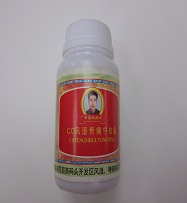| |
Information on oral corticosteroids
|
Preface |
Corticosteroids are synthetic analogs of the natural steroid hormones produced by the adrenal cortex . They are involved in a wide range of physiologic processes, including stress response, immune modulation and the regulation of inflammation. Corticosteroids suppress inflammation and help reduce associated signs and symptoms such as swelling, redness, itching, and allergic reactions. They are commonly used to treat various inflammatory and immune-related diseases.
In Hong Kong, oral corticosteroids are classified as prescription-only medicines. They should be prescribed and monitored closely by your doctor, with ongoing assessments to ensure that the therapeutic benefits outweigh the potential risks. |
|
 |
|
▲ back to top
Medicinal Use |
The three main uses of corticosteroids include:
- Reducing inflammation – Inflammation is the body’s response to infection, irritation, or injury. In allergic reactions, the immune system misidentifies a harmless substance as harmful, resulting in inflammation such as urticaria, atopic eczema. Corticosteroids help to reduce this inflammation.
- Suppressing the immune system – Corticosteroids can be used to treat conditions caused by a malfunctioning immune system, such as rheumatoid arthritis and systemic lupus erythematosus.
- Replacement therapy – When the adrenal glands do not produce enough of cortisol, corticosteroids are used as hormone replacement therapy.
|
Rheumatoid Arthritis
Rheumatoid Arthritis is an autoimmune disorder that causes joint inflammation, pain and stiffness. Corticosteroids help reduce inflammation and alleviate symptoms. They are typically used short-term, as long-term use can lead to serious side effects.
|
|
|
|
|
|
|
Asthma
Asthma is a chronic inflammatory condition that affects the airways. It causes repeated episodes of wheezing, shortness of breath, chest tightness, and nighttime and/or early morning coughing.
Corticosteroids are widely used for their anti-inflammatory properties in asthma management. While inhaled corticosteroids are commonly used for control of asthma, oral corticosteroids are usually reserved for short-term use during severe acute asthma attacks.
|
|
Dosage Forms of Corticosteroids
Corticosteroids are available in different dosage forms. They include oral (e.g. tablet, capsules, liquid), external (e.g. eye/ear drops, nasal spray, inhaler and cream/ointment) and injectables (e.g. intramuscular and intraarticular injections).
Examples of oral corticosteroids include prednisolone, prednisone, dexamethasone, betamethasone and hydrocortisone.
|
|
|
▲ back to top
Side Effects |
Side effects of corticosteroids depend on the dose, type, and duration of treatment. In general, low-dose inhaled or topical corticosteroids have fewer serious side effects than oral or injectable forms. Long-term or inappropriate use increases the risk of adverse reactions.
Possible side effects include the followings*:
- Fluid retention, causing swelling in your lower legs
- Rapid mood swings or change of mood
- Increased appetite that often leads to weight gain, with fat deposits in your abdomen, face and neck
- Symptoms of Cushing’s syndrome, including fatty deposits that develop in the face (moon face), stretch marks across the body and acne
- Cataracts
- Glaucoma – an eye condition where excessive fluid gathers causing increased pressure inside the eye
- High blood sugar, which can trigger or worsen diabetes
- High blood pressure
- Increased risk of infection
- Loss of calcium from bones, which can lead to osteoporosis and fractures
- Menstrual irregularities
- Suppressed adrenal gland hormone production
- Thin skin, easy bruising and slower wound healing
Important: Do not abruptly stop taking corticosteroids after long-term use, as this can lead to serious or fatal complications due to acute adrenal insufficiency. Doctors typically recommend gradual reduction in dosage based on your condition.
|
|
▲ back to top
Reduce Your Risk of Corticosteroid Side Effects* |
Side effects of corticosteroid drugs can be minimised by using the lowest effective dose for the minimum period possible. To get the most benefit with the least amount of risk, you should communicate with your doctor, be cautious about the signs and symptoms related to the side effects and adopt some lifestyle and behavioral modifications. |
|
 |
Communication with Your Doctor*
- Corticosteroids should only be used under medical supervision.
- Inform your doctor of any other medications that you are taking and your medical conditions, as interactions may occur or special precautions may be needed.
- Do not stop or adjust the dosage without consulting your doctor.
- Inform your health professionals that you are undergoing corticosteroids therapy.
- Seek medical advice promptly if you experience side effects, such as infection-like symptoms, mood changes (e.g., feeling depressed and anxious), or symptoms of Cushing’s Syndrome (e.g., moon face, weight gain, hair growth on face, limbs and back, stomach pain and joint pain), etc.
- Attend regular follow-up appointments if long-term corticosteroid use is necessary.
- Consult your doctor before receiving live vaccines as corticosteroids may weaken your immune system.
Method of Taking Oral Corticosteroids
- Always follow the dosage and administration instructions as prescribed by your doctor.
Lifestyle and Behavioral Modification*
- Avoid close contact with individuals who have chickenpox, shingles or measles, as you may be more susceptible to infection.
- Manage your weight through reduced calorie intake and increased physical activity.
- Exercise regularly to reduce muscle weakness and lower the risk of osteoporosis.
- Consult your doctor about calcium and vitamin D supplements or other medications to minimize bone loss.
|
|
▲ back to top
|
Storage
Oral corticosteroids should be stored in a cool dry place. Refrigeration is generally not required unless specified on the drug labels. Always keep medications out of reach and sight of children to prevent accidental ingestion.
|
|
|
▲ back to top
Proper Use of Health Products |
Many health products claim to relieve pain or improve airway problems. Patients with chronic conditions such as rheumatoid arthritis and asthma, may be tempted to use such products. However, some products, especially those purchased online, from overseas, or from unverified sources, have been found to contain undeclared corticosteroids.
Members of the public are strongly urged not to buy or consume products of doubtful composition or from dubious source.
The Department of Health has received reports of patients presenting symptoms of Cushing’s syndrome, (e.g. weight gain, moon face, hair growth on their face, limbs and back or even high blood pressure and high blood sugar) after consuming such products. Laboratory analysis confirmed that some of these products were adulterated with corticosteroids. You may wish to refer to the “Products found to contain undeclared medicines” of the Drug Office website for more information.
Improper use of corticosteroids can pose serious health risks. Self-medicating with health products may worsen your condition or lead to life-threatening consequences. Always consult your doctor or pharmacist and follow your prescribed treatment plan.
|
|


|
|
* This information may not cover all possible side effects, precautions, or medical advice. Always consult your healthcare professional for guidance.
|
▲ back to top
|







